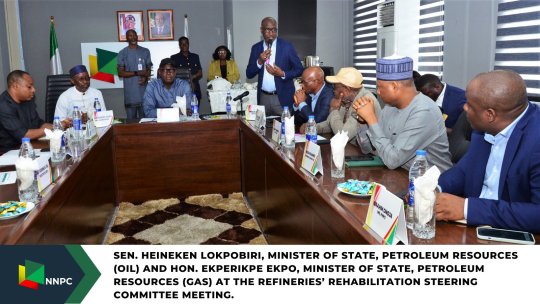#Ministry of Petroleum Resources
Text
NISCN, IHRC Conveys 1st Stakeholders' Consultative Meeting on Dangers of LPGs in Residential Areas
NISCN, IHRC Conveys 1st Stakeholders’ Consultative Meeting on Dangers of LPGs in Residential Areas
ABUJA: Ahead of the implementation of ‘Project Safety’, a global safety action against illegal gas proliferations, the National Industrial Safety Council of Nigeria (NISCN) and International Human Rights Commission (IHRC) in Nigeria, alongside stakeholders in industrial safety comprising of the…

View On WordPress
#Federal Ministry of Petroleum Resources#Federal Road Safety Corps FRSC#FMITI#International Human Rights Commission Nigeria#National Industrial Safety Council of Nigeria#Nigeria Police Force#Nigerian Red Cross Society#Project Safety#Proliferation of gas#SON
0 notes
Text
On April 21, Ali Hussein Julood, a 21-year-old living in the Iraqi town of Rumaila, on the outskirts of one of the world’s largest oil fields, died from leukaemia. He was told by doctors that pollution from gas flared in the nearby field, which is operated by British Petroleum (BP), had likely caused his cancer. “Gas flaring” is a low-cost procedure used by oil companies to burn off the natural gas expelled during drilling. [...] [I]t also contributes to global warming [...]. Some of the pollutants released during this process, such as benzene, are known to cause cancers and respiratory diseases. Ali, who had been battling cancer for six years when he died, was only the latest victim of the environmental degradation caused by international oil companies like BP in Iraq.
In towns and villages near the country’s vast oil fields, thousands of other men, women and children are still living under smoke-filled skies and suffering avoidable health problems because company executives insist on putting profit before lives. [...]
[A] confidential report from the Iraqi health ministry recently obtained by the BBC blamed pollution from gas flaring, among other factors, for a 20 percent rise in cancer in Basra, southern Iraq between 2015 and 2018. A second leaked document, again seen by the BBC, from the local government in Basra showed that cancer cases in the region are three times higher than figures published in the official nationwide cancer registry.
Like many other problems and crises that are devastating the lives of ordinary Iraqis today, the chain of events that led to the poisoning of southern Iraq’s skies by international oil companies also started during colonial times.
---
In the early 20th century, as its navy transitioned from coal to petrol, Britain found itself in increasing need of oil to run its empire and fuel its numerous war efforts. [...] In 1912, Britain formed the Turkish Petroleum Company (TPC) with the purpose of acquiring concessions from the Ottoman Empire to explore for oil in Mesopotamia. Following World War I, it brought modern-day Iraq under its own mandate [...]. By 1930, the TPC was renamed the Iraqi Petroleum Company (IPC) and was put under the control of a consortium made up of BP, Total, Shell and several other American companies. Together, they pushed for a series of “concession agreements” with the newly formed Iraqi government which would give them exclusive control of Iraq’s oil resources on pre-defined terms for long periods. By 1938, the IPC and its various subsidiaries had already secured the right to extract and export virtually all the oil in Iraq for 75 years. These concessions were granted to the IPC and its subsidiaries while Iraq was ruled by British-installed monarchs and under de facto British control. Thus the state had almost no negotiating power against the British-led consortium [...] In 1955, the Iraqi government started to voice its desire to use the gas being flared in Rumaila and Zubair for electricity generation. In 1960, while negotiating a concession with the IPC, then-Iraqi Prime Minister Abd al-Karim Qasim formally asked the company to let Iraq exploit the gas that it was not using. The same demand came up again and again [...], but IPC and its subsidiaries repeatedly turned the Iraqi government down. [...]
Following the 2003 invasion, the Iraqi oil industry was once again privatised as a result of pressure from the US and the International Monetary Fund (IMF). As was the case in the early 20th century, any negotiations on oil extraction rights took place when Iraq was still under foreign occupation [...]. When the process of auctioning off oil fields in southern Iraq began in 2008, the Iraqi government offered foreign oil companies long contracts of up to 25 years, reminiscent of the early concessions agreements with the IPC. These included stabilisation clauses, which insulated foreign companies from legal changes that might emerge over the course of their contracts. This meant that the companies were, and continue to be, unaffected by any environmental regulations passed by the Iraqi government to reduce pollution [...].
---
Looking back at the development of the oil industry in southern Iraq makes apparent that the kind of pollution that killed Ali has been in the making for some 70 years. His death – like the deaths of many others who succumbed to pollution-related cancers in his country – was not an unavoidable tragedy, but the natural consequence of a long history of colonial violence and extractive capitalism.
Predatory colonial practices that began over a century ago caused southern Iraq’s vast oil reserves to be left under the sole control of foreign companies today – companies that over and over again put profit before the lives of the Iraqi inhabitants of the lands they exploit.
Ali’s death is yet more proof that colonial violence is far from over and that it has many different faces.
---
Text by: Taif Alkhudary. “Southern Iraq’s toxic skies are a colonial legacy.” Al Jazeera (English). 12 June 2023. [Some paragraph breaks/contractions added by me.]
339 notes
·
View notes
Text
At the start of January 2023, the Ukrainian army began regularly targeting Russian oil and gas refining facilities. Between January 18 and February 3, Ukraine’s Armed Forces carried out seven drone strikes against oil infrastructure, while at least two more drones were shot down in the Nizhny Novgorod region, which contains a refinery. While Ukraine has been attacking petroleum industry targets throughout the war, previous attacks targeted facilities in occupied or border regions. Now, Ukrainian drones have started hitting targets in the Leningrad, Volgograd, and Yaroslavl regions. The independent Russian outlet iStories dug into what these attacks could mean for the next phase of the full-scale war. Meduza has translated the analysis into English.
How vulnerable are oil refiners to drone attacks?
The Novatek chemical terminal in the Leningrad region’s Ust-Luga settlement ceased operations after a drone attack on January 21 — as did the oil refinery in Tuapse on January 25. On January 31, Russia’s Energy Ministry said that the terminal in Ust-Luga was up and running again. A refinery in Volgograd that was hit in an overnight drone attack on February 3 stopped part of its production to repair damage, sources at the plant told Russian newspaper Kommersant. Official reports say the refinery is operating normally.
Oil refineries’ vulnerability to small drones shouldn’t be exaggerated, according to Sergey Vakulenko from the Carnegie Center: “The standards at which Russian oil refineries are built and modernized stems from Cold War-era technical standards. At the time, they were designed to ensure the resilience of plants even during conditions of aerial bombardment by 1000 kilogram (1.1-ton) bombs. That means that drones weighing only a few kilograms can set a refinery on fire, but it can’t destroy it.” Even if a drone hits the most vulnerable part, the gas fractionation unit, it would cause a large explosion which could put a plant out of commission, but it wouldn’t wipe out the whole facility.
However, Russia’s refineries may have difficulties repairing the damaged Western equipment that they started using widely after 2008, Vakulenko notes. It’s now impossible for Russian companies to get all of the parts and expertise they need due to sanctions, and Chinese technology may prove incompatible.
Are air defenses able to defend oil refineries?
There are two ways to defend targets in the deep rear from drones: shielding the border from the enemy and shielding the targets themselves.
It’s difficult for Russia to defend its entire border with Ukraine due to its expanse, explains the Israeli military expert David Sharp. Drones are a difficult target for Russian air defenses. Made out of plastic and composite materials, drones are hard to detect by radar. They also fly relatively low to the ground.
Some of the Ukrainian drones flying into Russian territory are intercepted by air defense systems right in the border regions, especially in the Belgorod region, according to Sharp. “Ideally, air defenses are supposed to catch all drones near the border, but this requires many complexes, many long-range detection systems, including airborne ones, like the A-50 aircraft,” he says. It also requires coordinated effort from all air defense units: “There are many technical and organizational aspects involved; it can’t all be airtight.”
Another option is to put air defense complexes near every facility that could be a target for drone attacks, Sharp explains. This would likely require short- and medium-range systems such as Russia’s Pantsir. It would also likely require more than one complex per facility. After the strikes on the terminal in Ust-Luga and the refinery in Tuapse, Vakulenko wrote that another 18 Russian refineries could come under attack.
“For Russia, defending oil refineries is a significant diversion of resources — even when it succeeds. Many air defense systems need to be deployed either to defend the borders or to defend the facilities, or for both. You either take these systems from the front line, or you increase production, which is very costly,” says Sharp.
Russia doesn’t have enough air defense systems to protect all of its facilities scattered across its vast territory. If attacks continue, according to analysts at the Atlantic Council, Russia’s military command will have to decide where to use air defenses — on the front or in the rear.
Are attacks on oil refineries a new strategy for Ukraine’s Armed Forces?
Yes and no. On the one hand, applying a “long arm,” i.e. hitting targets deep in the enemy’s territory, has increasing been a priority and an important factor in the war’s development, according to Sharp. On the other hand, these efforts have occurred independently of the situation on the front, where reality dictates a defensive strategy.
Military expert Kirill Mikhailov agrees: “These attacks play an important role in both defense and in offense. During the Second World War, the U.S. and the U.K. spent several years looking for ways to inflict as much damage as possible on fascist Germany through bombings.” Strikes on residential buildings and factories didn’t bring about significant results, but closer to 1945, the U.S. “found Germany’s achilles heel.” “They turned out to be synthetic fuel plants. These were huge plants that couldn’t be hidden, and required a lot of time to repair. By the end of the war, the Allies had practically deprived Germany of fuel."
What damage have the drone attacks on Russian oil refineries caused to the economy so far?
This is a difficult question. Here’s what we know.
On January 25-30, Russia saw a nearly four-percent drop in oil processing (compared to January 2023), according to Bloomberg. During the last week of January, the disruptions at the plants in Ust-Luga and Tuapse, which were targeted by drones, may have begun to affect operations at the facilities. In December, around five percent of Russia’s oil processing took place at these plants. There was also a decrease in the amount of output at the oil refinery in Volgograd.
According to Russian newspaper Kommersant, oil refineries processed 1.4 percent less in January than they did in December, and four percent less than in January 2023. While this is partially attributable to annual maintenance and reductions related to Russia’s commitments as part of agreements made with Saudi Arabia to decrease its oil production, it’s also a result of the shutdowns following drone attacks.
On January 31, Russia’s Energy Ministry officially announced measures “to compensate for the declining volumes of automotive gasoline caused by unplanned repairs at the plants.” In order to secure enough gas for the domestic market, the authorities reduced shipments abroad. This caused gas exports to fall by 37 percent and diesel exports by 23 percent compared to January 2023. It’s not clear to what extent these repairs were related to the drone attacks.
Experts say that continued attacks on oil refineries could decrease export volumes (oil products currently account for a third of total oil exports, notes Vakulenko), create a fuel shortage in the country, and even affect the front lines — though it’s difficult to assess under what conditions this would occur and how serious the consequences would be.
Attacks on critical infrastructure, rather than an “endless bloodbath on the front lines,” is what could inflict truly serious damage on Russia, writes British writer and historian Owen Matthews: “Perhaps this is what will make the war too expensive and painful for Putin.”
3 notes
·
View notes
Text
Brazil at a Crossroads: The Environment or Oil and Gas
President Luiz Inácio Lula da Silva’s administration brought high hopes of reversing devastating environmental destruction. Will a new fossil fuel boom undermine promises for change?

With record-setting fires in the Amazon dominating headlines in recent years, the global environmental imaginary of Brazil often brings up scenes of deforestation, threats of tremendous biodiversity loss, and violent displacement driven by the cattle, forestry, and agribusiness industries. Now, on the heels of a wave of oil industry privatizations, pressure has mounted around the question of oil extraction in the Amazon. While deforestation often tops the national and international agenda, less present is the question of air pollution from the country’s oil, gas, and coal industries.
Care for the environment, however, seems to be part of Brazil’s social fabric, or what brings a lot of people together. In January 2023, President Luiz Inácio Lula da Silva returned to power on a platform of socioeconomic change and environmental protection. His appointments of Marina Silva to head the Ministry of Environment and Climate Change and Sônia Guajajara to lead the new Ministry of Indigenous Peoples were especially promising.
But a strong governmental commitment to environmental issues has been lacking. Lula has faced strong criticism for his lack of firm opposition to congressional moves that diluted the powers of both ministries, stripping them of tools to protect water resources, prevent land grabbing, and slow deforestation.
Brazil’s oil production increased in 2022 to 3 million barrels per day, mostly from its deep-water offshore pre-salt oil fields. The energy minister recently announced a projected goal of producing 5.4 million barrels per day by 2029, which would elevate Brazil to being the fourth largest oil producer in the world and lock the country into a carbon-intensive energy model. Giant corporations like Total, Equinor, and Petronas are already reaping the profits. On December 13, the day after the COP28 climate summit ended, the Brazilian National Petroleum Agency (ANP) auctioned drilling rights to 602 exploration areas, several in buffer zones of protected areas in the Amazon that would impact Indigenous and quilombola territories. The state oil company Petrobras—despite being discredited in a sweeping corruption scandal that played out between about 2014 and 2018—is now suddenly positioned to become a major corporate player regionally and globally.
Environmental protection often takes a back seat to the alleged economic benefits of extracting oil, gas, and coal, and national and international news reports rarely mention pressing environmental issues tied to these resources’ climate-heating and public health impacts. As Brazil’s fossil fuel industry eyes expansion, closer scrutiny of the consequences of air pollution from oil, gas, and coal, especially on communities living near oil and gas facilities, is urgently needed.
Continue reading.
3 notes
·
View notes
Text
The Minister of State for Petroleum Resources, Sen. Heineken Lokpobiri, and the former Executive Secretary of the Nigerian Content Development Monitoring Board (NCDMB), Simbi Wabote, have disagreed over $500 million investments made during the latter’s tenure.
In a statement issued by Lokpobiri on Tuesday through his media aide, Nnaemeka Okafor, the Minister said that NCDMB under the leadership of Wabote “wasted” over $500 million of the industry’s fund on equity investments, private establishments, and non-performing loans.
The Minister had earlier alleged that Wabote paid $35 million for the Brass modular refinery in Bayelsa State without anything to show for it.
He had also alleged that $20 million was paid for a fertilizer factory that was yet to materialize.
He had claimed that approximately $350 million was transferred to the Bank of Industry by the board to provide loans to investors, asserting that the funds were mismanaged with 90% of the loans non-performing.
Wabote fires back
On his part, the former NCDMB boss, Simbi Wabote, had also allleged that Lokpobiri’s “reckless statements” in the past months were not new to him.
He said,
”My problem as the Executive Secretary started with Lokpobiri in December 2023 when he sent one of his undocumented aides within his ministry to my office in Yenagoa (Blackson) requesting me to increase the NCDMB budget by N30bn for the office of the Minister, and I said it had never been done before.”
Wabote said that he informed the oil minister that during his tenure under two previous ministers, none had ever demanded such actions from the NCDMB.
He said that the board solely allocated funds for the office of the Chairman of the Council, which included coverage for his travel expenses.
“I said to him that the maximum the NCDMB budget has ever got to in the past is circa N80bn for all our activities, adding N30bn will be too much for his office and I was not going to do it,” he stated.
Lokpobiri’s position
In Lokpobiri’s statement on Tuesday, the Minister noted that investigations are ongoing and that all funds belonging to the generality of Nigerians will be recovered.
According to him, if Mr. Wabote has proof of budget padding accusations, he should provide it to the public.
”Let me add that these revelations are not new, they were first made during an investigative hearing of the House of Representatives Committee on Local Content. Again, the records are there and you are welcome to verify these facts.
“The Minister has never been part of any budgeting process of any parastatal under the ministry.
‘’Secondly, the minister has no aide called Blackson. All his aides were duly selected in line with extant laws and have documents to that effect.
“Thirdly, the said Atlantic Refinery was supposed to be built in Mr Wabote’s home town, he should show Nigerians where that refinery is.
‘’Fourthly, the Brass Fertilizer and Petrochemical company was also paid for.
’Finally, the Minister’s office is run with a budget superintended by the permanent secretary and so one will wonder, how the Minister will ask another entity to make provisions for the budget of his office,” the statement reads.

View On WordPress
0 notes
Text
Australia Has A Tax System Which Unfairly Taxes The Working Poor

The newly amended Stage 3 tax cuts are making headlines at the moment. Political point scoring about broken promises has been less effective than usual. Perhaps the cost of living crisis and the unfairness of the tax regime may have something to do with that. Australia has a tax system which unfairly taxes the working poor rather than the wealthy. The LNP Coalition under the aegis of former PM Scott Morrison wanted to accentuate that even further via the regressive stage 3 tax cuts for the highest earning Australians. Their federal replacement, the Albanese Labor government amended those tax cuts to be shared more broadly with middle Australia.

Photo by cottonbro studio on Pexels.com
Ordinary Australians Pay The Most Via Income Tax
Despite this relatively good news for the working poor the tax burden remains unfairly skewed in favour of the wealthy. The capital gains tax omission on the family home no matter the value of the designated home means billionaires can squirrel away untold millions via this measure. Family trusts are another tax minimisation way for the wealthy to avoid paying taxation in Australia. Superannuation in Australia has been another bolthole for the seriously rich to avoid tax on their wealth. Income tax is the workhorse of the taxation system in this country and the burden falls most heavily on those that can afford it least.

Photo by Kateryna Babaieva on Pexels.com
Why Doesn’t Australia Tax Fossil Fuel Corporations Properly?
In Australia we subsidise large multinational fossil fuel corporations and mining companies by lessening their tax burden for some strange reason. State and federal governments cut lucrative deals for these big companies. One wonders why? Few other nations around the globe make it so financially attractive for these multinationals to extract their profitable resources. Australia, unlike many other places offers a stable and friendly environment in which to mine. Australia is the third largest exporter of energy resources in the world. Our LPG gas is fuelling Japan and many other nations. Our petroleum rent tax brings in bugger all in the greater scheme of things, especially when compared to similar schemes elsewhere. It is as if some of our people have cut deals to benefit themselves at the expense of what could be raised for the nation as a whole.
“Norway’s Ministry of Finance projects that tax revenue from oil and gas will be a staggering A$127 billion or around $23,500 per Norwegian citizen in 2023 alone.”
- (https://australiainstitute.org.au/post/norway-shows-how-australia-can-get-a-fair-return-from-oil-and-gas/)
Australia’s Petroleum Rent Tax Revenue
“There are 10 entities in the 2020–21 PRRT transparency population, with total PRRT payable of $926 million. The number of entities paying PRRT decreased from 12 in the previous year, and PRRT payable increased from $881.1 million.”
- (https://www.ato.gov.au/businesses-and-organisations/corporate-tax-measures-and-assurance/large-business/in-detail/tax-transparency/corporate-tax-transparency-report-for-the-2020-21-income-year/petroleum-resource-rent-tax)

Photo by Loïc Manegarium on Pexels.com
Richard Denniss, the chief economist at the Australia Institute, recently presented a speech on tax at the National Press Club. He made these observations about our tax system and the unfair burden it places on ordinary workers. It seems in Australia we have allowed our politicians to rig a tax regime favouring the wealthy and the big end of town. Could this be a result of lobbying by the fossil fuel industry and political donations to our two major political parties? If you look at the records you will see the fossil fuel sector is the most active lobby group and the biggest political donor.
“Four of the nation’s biggest fossil fuels companies paid over 13,000 times more in “donations” to the major political parties last financial year than they collectively paid in taxes in 2020-21. Australian Electoral Commission (AEC) data released this morning shows Chevron, Santos, Whitehaven Coal and Woodside together made $390,930 in political “donations” to the ALP and the Liberal and National parties last financial year.”
- (https://theklaxon.com.au/fossil-fuels-donations/)

Australians Being Screwed By Vested Interests
It is pretty bloody obvious that we are being screwed by a process tainting our governments and without recourse to proper oversight or remedy. Governments and the current political system are failing us. Meanwhile, the smokescreen of cultural warfare and the politics of grievance continues. Neocons beat up emotive narratives about Australia Day merchandise not being available in Woolworths and misplaced corporate conscience regarding the colonial invasion of the continent on that day. More inflammatory is the war in Gaza and the accusations of rampant antisemitism by anyone standing up for the Palestinian’s right to exist. Of course, the Palestinian people are in fact Semitic themselves. The protest against genocide by the Israel state is anti- Zionist if a label is required. Over in America the GOP are virulently anti-woke, attacking LGBTQIA folk and their right to exist. The culture wars hide the real stuff going on, which is the control of our governments by big money. Corporate dollars get politicians re-elected and they are, therefore, beholden to the donors and their interests. Our tax system reflects this relationship.
https://www.housetherapy.com.au/social-housing/

Photo by Tima Miroshnichenko on Pexels.com
Until we effectively ban all corporate and private donations to political parties we will continue to be at the mercy of their power and influence. One citizen, one vote does not work if the democratic system is being undermined by large political donations by wealthy folk and corporations. Big money is always the loudest voice in the room. The unfair nature of our current taxation regime is proof positive of that. Australia has a tax system which unfairly taxes the working poor rather than the wealthy.
https://www.youtube.com/watch?v=y7mwGnb4CkA
Robert Sudha Hamilton is the author of Money Matters: Navigating Credit, Debt, and Financial Freedom.
©HouseTherapy

Read the full article
#Albanese#Australia#Coalition#corporategreed#fossilfuels#incometax#Labor#LNP#lobbying#Morrison#politicaldonations#stage3taxcuts#tax#undueinfluence#unfair#wealthy#workingpoor
0 notes
Text
HSE Legislation in Nigeria: Compliance and Regulations

Health, Safety, and Environment (HSE) legislation play a pivotal role in safeguarding the well-being of workers and the environment within any country. In Nigeria, understanding and adhering to HSE regulations are imperative for businesses and industries to operate responsibly. This article delves into the realm of hse courses in nigeria, emphasizing the importance of compliance and regulations.
1. Overview of HSE Legislation in Nigeria:
a. Legal Framework:
Nigeria has established a comprehensive legal framework governing HSE. Various laws, regulations, and guidelines ensure that businesses adhere to standards that prioritize the health and safety of workers and the protection of the environment.
b. Regulatory Authorities:
Regulatory bodies such as the Federal Ministry of Labour and Employment, the Nigerian Institute for Occupational Safety and Health (NIOSH), and the Department of Petroleum Resources (DPR) oversee and enforce HSE regulations in Nigeria.
2. Compliance for Workplace Safety:
a. Workplace Risk Assessment:
HSE legislation mandates that employers conduct thorough risk assessments in workplaces. Identifying potential hazards and implementing preventive measures are crucial steps in ensuring the safety and well-being of workers.
b. Emergency Preparedness:
Businesses are required to have effective emergency response plans in place. This includes training employees on emergency procedures, maintaining first aid facilities, and having proper evacuation measures to mitigate risks.
3. Employee Training and Competency:
a. HSE Courses in Nigeria:
The availability of hse training in nigeria is vital for ensuring that employees are well-versed in safety protocols. These courses cover a range of topics, including hazard identification, risk assessment, and emergency response, contributing to a safer working environment.
b. Continuous Competency Development:
HSE legislation emphasizes the need for continuous competency development. Regular training and retraining programs ensure that employees stay updated on the latest safety standards and procedures.
4. Environmental Protection Measures:
a. Waste Management:
HSE regulations in Nigeria include provisions for proper waste management. Industries must adopt environmentally friendly practices to minimize the impact of waste on ecosystems and communities.
b. Pollution Prevention:
Businesses are obligated to implement measures to prevent pollution. This includes the responsible disposal of hazardous materials, adherence to emission standards, and adopting technologies that minimize environmental impact.
5. Oil and Gas Industry Regulations:
a. DPR Guidelines:
The Department of Petroleum Resources (DPR) plays a pivotal role in regulating HSE in the oil and gas sector. Stringent guidelines are in place to ensure the safety of workers and prevent environmental degradation in this critical industry.
b. Compliance Audits:
Regular compliance audits, conducted by regulatory bodies, are essential for the oil and gas industry. These audits assess whether companies are adhering to HSE regulations and implementing best practices in their operations.
6. HSE Training in Port Harcourt:
a. Hub of HSE Training:
Port Harcourt has emerged as a hub for HSE training in Nigeria, offering a range of courses to professionals in various industries. This strategic focus on training contributes to building a skilled workforce capable of maintaining high safety standards.
b. Regional Relevance:
Considering Port Harcourt's significance in the oil and gas sector, HSE training in the region is particularly relevant. Professionals engaged in the industry can benefit from specialized courses tailored to the challenges and risks unique to this region.
7. Benefits of HSE Compliance:
a. Reduced Incidents and Accidents:
Strict adherence to HSE regulations leads to a significant reduction in workplace incidents and accidents. This, in turn, contributes to the well-being and morale of the workforce.
b. Enhanced Corporate Image:
Companies that prioritize HSE compliance project a positive corporate image. Stakeholders, including clients, investors, and the community, are more likely to engage with businesses that demonstrate a commitment to safety and environmental responsibility.
8. Future Trends and Evolving Standards:
a. Adapting to Global Standards:
The landscape of HSE is dynamic, with global standards constantly evolving. Nigerian businesses must stay abreast of international best practices and adapt their policies to align with emerging trends in health, safety, and environmental protection.
b. Technological Integration:
The integration of technology, such as the use of artificial intelligence for risk assessments and the implementation of smart safety monitoring systems, is expected to play a significant role in enhancing hse competency courses.
Conclusion: Safeguarding Nigerian Workplaces and the Environment
In conclusion, navigating HSE legislation in Nigeria is a critical responsibility for businesses and industries. Ensuring compliance with regulations, prioritizing workplace safety through hse training in port harcourt and actively contributing to environmental protection are essential elements of responsible corporate citizenship.
#hse courses in nigeria#hse training in nigeria#hse competency courses#hse training in port harcourt
0 notes
Text
BIS hiring consultants for standardization; one-year, Rs. 75,000/month.
New Post has been published on https://www.jobsarkari.in/bis-hiring-consultants-for-standardization-one-year-rs-75000-month/
BIS hiring consultants for standardization; one-year, Rs. 75,000/month.
The Bureau of Indian Standards (BIS), under the Ministry of Consumer Affairs, Food and Public Distribution, is seeking consultants for standardization activities on a one-year contract basis. BIS is responsible for standardization, certification, hallmarking, and laboratory testing in India, as well as at the international level. The recruitment is open to candidates with the necessary qualifications and experience in various departments such as Ayush, Civil Engineering, Chemical, Electrotechnical, Food & Agriculture, Electronics and Information Technology, Mechanical Engineering, Medical Equipment and Hospital Planning, Metallurgical Engineering, Management and Systems, Petroleum Coal and Related Products, Production and General Engineering, Service Sector, Transport Engineering, Textiles, and Water Resources. Interested applicants must apply online through the BIS website from December 30, 2023, to January 19, 2024. No other means of application will be accepted. The monthly remuneration for the consultant positions is fixed at Rs. 75,000.
Bureau of Indian Standards (BIS) is the National Standards Body of India and is responsible for activities in the field of Standardization, Product and System Certification, Hallmarking, Laboratory Testing, etc.
BIS invites online applications for engaging Consultants for Standardization Activities on a contract basis for one year.
There are various departments for which consultants are required, such as Ayush Department, Civil Engineering Department, Chemical Department, etc.
The upper age limit for applying as a consultant is specified for each department.
Interested candidates can apply online on the BIS website from 30.12.2023 till 19.01.2024.
The remuneration per month for the consultant position is Rs. 75,000 (fixed).
Bureau of Indian Standards (BIS)
BIS is the National Standards Body of India
Responsible for Standardization, Product and System Certification, Hallmarking, Laboratory Testing, etc.
Plays a crucial role in ensuring quality and safety in various industries
Consultants for Standardization Activities
BIS is inviting online applications for engaging consultants on a contract basis
Consultants will work on standardization activities for one year
Opportunity to contribute to the development of national standards
Various Departments
Consultants are required in different departments such as Ayush, Civil Engineering, Chemical, Electrotechnical, etc.
Each department has a specific number of posts available
Eligibility Criteria
Candidates must possess the educational qualifications and experience as prescribed for each department
Upper age limit specified for applying as a consultant in each department
Aimed at ensuring the right expertise and knowledge for each role
Application Process
Interested candidates can apply online on the BIS website
Application period: 30.12.2023 to 19.01.2024
No other means of application will be accepted
Remuneration
The monthly salary for the consultant position is Rs. 75,000 (fixed)
Competitive compensation for the expertise and contributions required
Reflects the value placed on standardization activities
Opportunities Await in BIS!
Join BIS as a consultant and contribute to standardization activities
Help shape national standards and ensure quality and safety in various industries
Apply online on the BIS website before 19.01.2024 and seize this opportunity!
You see the following because WP_DEBUG and WP_DEBUG_DISPLAY are enabled on this site. Please disabled these to prevent the display of these developers' debug messages.
The `the_content` filter applied.
The `the_content` filter applied.
The `the_content` filter applied.
true
Not an instance if `WP_Post`.
Not an instance if `WP_Post`.
Not an instance if `WP_Post`.
NULL
Post eligible.
Post eligible.
Post eligible.
false
0 notes
Text
Governor Adeleke approves N15,000 wage award for Osun civil servants

The Osun State Governor, Ademola Adeleke has approved the payment of N15,000 as a wage award to civil servants.
Governor Adeleke also revealed that pensioners in the state will receive the sum of 10,000 as a wage award.
He also noted that the wage award will run for six months, beginning from the month of December.
This was contained in a statement signed by his spokesperson, Olawale Rasheed and obtained by us on Wednesday.
The Governor also stated that the action was a continuation of his commitment to workers’ welfare and a fulfilment of his pledge for the gradual rollout of palliative measures to cushion the effect of subsidy removal.
He said, “On the first day of my second year in office, I unveil this wage award and reaffirm our five-point agenda which has workers’ welfare as the number one item.”
Also, making approval in a circular issued by Sunday Olugbenga Fadele, a Permanent Secretary in the Ministry of Human Resources and Capacity Building on Wednesday in Osogbo, Governor Adeleke said the step was taken as a measure to mitigate the impact of subsidy removal.
“Sequel to the negotiation meetings and interactions with the labour movement in Osun state, including the representatives of Nigeria Union of Pensioners, the Governor of Osun State, His Excellency, Senator Ademola Jackson Nurudeen Adeleke, has approved the monthly payment of N15,000 to each active worker and N10,000 to each pensioner in Osun state as palliatives to assuage the pains being experienced as a result of removal of petroleum subsidy by the Federal Government of Nigeria. The payment, as approved, is to commence from the month of December 2023 for a period of six (6) months,” the circular reads in part.
“While acknowledging and appreciating the understanding of Osun state workers and pensioners for their show of understanding regarding the efforts of the State Government in the last one year to improve tremendously on their welfare, being the first on the 5-point Action Plan, the present administration will continue to ensure its commitment to the welfare of workers are met at all times.
“It is expected that this gesture of government will spur workers in the State to be more diligent and committed to their duties.”
Read the full article
0 notes
Text
By • Olalekan Fagbade
BREAKING: President Tinubu approves nine new appointments into NNPCL [Full list]
President Bola Tinubu has approved the appointment of a new board and management team for the Nigerian National Petroleum Company Limited (NNPCL) with effect from December 1, 2023:
The composition is as follows:
Chief Pius Akinyelure — Non-Executive Board Chairman
Mallam Mele Kolo Kyari — Group Chief Executive Officer
Alhaji Umar Isa Ajiya — Chief Financial Officer
Mr Ledum Mitee — Non-Executive Director
Mr Musa Tumsa — Non-Executive Director
Mr Ghali Muhammad — Non-Executive Director
Prof. Mustapha Aliyu — Non-Executive Director
Mr David Ogbodo — Non-Executive Director
Ms Eunice Thomas — Non-Executive Director
President Tinubu further approved the appointment of two Permanent Secretaries, namely Mr. Okokon Ekanem Udo, Permanent Secretary, Federal Ministry of Finance, and Ambassador Gabriel Aduda, Permanent Secretary, Federal Ministry of Petroleum Resources.
0 notes
Text
Egypt increases fuel prices
Egypt raised fuel prices for various octanes, but kept diesel prices unchanged, according to a statement by the ministry of Petroleum and Renewable Resources on Friday, November 3. Egypt increased the price of 80-octane gasoline from EGP 8.75 (USD 0... Read more »
0 notes
Text
Nigerian Indicted In P&ID Scandal, Grace Taiga Is Dead
The former Director of Legal Services of the Ministry of Petroleum Resources, Grace Taiga, accused of collecting bribes from Process and Industrial Developments (P&ID) Limited, is dead.
Taiga reportedly died in September 2023 after battling kidney disease, but her demise was hidden from the public by her family.
According to TheCable, Taiga died in September 2023, after battling with kidney…

View On WordPress
0 notes
Text
Bio-Based Naphtha Market: Renewable Energy Regulations
Produced from organic feedstocks through advanced bio-refining processes, bio-based naphtha offers numerous applications across various industries. These include petrochemicals, plastics, and biofuels. The eco-friendly liquid fuel also contributes to a reduced carbon footprint and an environmentally conscious future. As per Inkwood Research, the global bio-based naphtha market is anticipated to record a CAGR of 17.07% in terms of revenue and 16.19% in terms of volume during the forecast period, 2023 to 2032.
With the rise in measures to encourage bio-based products’ use, businesses and consumers are increasingly prioritizing environmentally responsible practices. For example, the BioVerno Naphtha by UPM Corporation (Finland) is a sustainable alternative for replacing fossil raw materials in chemical production. Its lower carbon footprint and decreased reliance on finite resources help industries minimize their environmental impact.

Furthermore, several regions globally have implemented a number of regulations for sustainability and renewable energy, which has further increased the demand and adoption of bio-based naphtha.
These include –
United States: In the United States, the Renewable Fuel Standard (RFS) mandates the blending of biofuels, including bio-based naphtha, into transportation fuels to reduce greenhouse gas emissions. Essentially, the national policy requires a certain volume of renewable fuel to reduce or replace the quantity of petroleum-based transportation fuel, jet fuel, or heating oil.
European Union: With several initiatives to encourage the use of bio-based products, the Europe bio-based naphtha market is set to dominate the the global market. The region has also implemented numerous regulations for sustainability and renewable energy management. For example, The Bioeconomy Strategy, as well as the Renewable Energy Directive (RED), provide clear criteria and encourage the use of renewable feedstocks. In this regard, the Renewable Energy Directive (RED) sets targets regarding the use of renewable energy in fuels, thus promoting the adoption of bio-based naphtha.
Brazil: In an effort to increase the use of biofuels, while reducing greenhouse gas emissions, Brazil’s energy ministry launched its national biofuels policy, RenovaBio, in 2018. The key concept of RenovaBio is to reduce carbon emissions and improve the life-cycle performance of biofuels through a carbon credit market. Moreover, it also incentivizes the production and use of bio-based fuels, including naphtha, through decarbonization credits.
India: In India, the National Policy on Biofuels encourages the production and use of biofuels to reduce fossil fuel dependence and mitigate environmental impacts. The policy aims to utilize, develop, and promote domestic feedstock and its usage in the production of biofuels. While contributing to national energy security, it also helps in creating new employment opportunities.
Australia: Australia’s renewables deployment has a positive outlook given the success of rooftop solar, ambitious targets, as well as increased funding at federal and state levels. Furthermore, in addition to passing the Climate Change Act in 2022, Australia also aims to increase the share of low-carbon power generation by 2030 – with 82% derived from renewable sources, thus influencing the demand for bio-based naphtha as a feedstock.
Japan & Germany: Feed-in Tariff (FIT) is designed to support the development of renewable energy sources by offering a guaranteed, above-market price for producers. The policy also provides incentives for renewable energy generation, fostering the development of bio-based fuel and chemical production, including naphtha. Although common in the United States, FITs are used most notably in Japan and Germany.
In all, the aforementioned regulations reflect the global effort to transition towards sustainable and green energy sources. With a strong focus on reducing carbon emissions and promoting the use of renewable feedstock, these sustainable initiatives are set to play an essential role in boosting the global bio-based naphtha market growth during the forecast period.
FAQ
How is bio-based naphtha produced from biomass sources?
Bio-based or renewable naphtha is typically produced through processes like pyrolysis, gasification, or bio-refining, where biomass feedstocks are converted into liquid hydrocarbons.
What are the major companies operating in the global bio-based naphtha market?
Euglena Co Ltd, ENI Spa, Phillips 66, etc., are among the top companies operating in the global bio-based naphtha market.
#bio-based naphtha market forecast#bio-based naphtha market#BIO CHEMICALS#inkwood research#market research reports
0 notes
Text




With this soil map, we go a long way from home as we explore the Arabian Peninsula.
The map was realised in 1963 through the joint sponsorship of the governments of the United States and Saudi Arabia.
🗺️ 𝗠𝗔𝗣 𝗜𝗡𝗙𝗢
Soil map of the Kingdom of Saudi Arabia. Ministry of petroleum and mineral resources. Compiled by the U.S. Geological Survey and the Arabian American Oil Company untder the joint sponsorship of the Kingdom of Saudi Arabia, Ministry of the Petroleum and Mineral Resources, and the U.S. Department of State; 1963.
If you like our work, want to see our daily updates (or want to say hello to our studio), consider to follow our Instagram or Twitter account. Otherwise if are interested in our prints or have a custom request check our shop.
#saudiarabia#saudiarabian#arabianpeninsula#geologyporn#mapporn#cartography#cartographyart#cartographycommunity#oilcompany#geologicalsurvey#shadedrelief#petroleum#petroleumgeology#3dmap#3dmapping#yémen#asiamaps
1 note
·
View note
Text
East African energy boom investments to take focus in budgets
Kenya, Uganda and Tanzania plan to allocate money in their annual budgets to spur investment in infrastructure to exploit oil and natural gas from deposits that companies including Tullow Oil are developing.
Ugandan and Kenyan oil discoveries, made in 2006 and 2012 respectively, and new gas finds off the coast of Tanzania that have boosted reserves to as much as 46 Tcf have seen East Africa become a frontier for petroleum exploration.
The three countries, along with Rwanda, which are all members of the East African Community, will present their budget statements for the financial year starting July 1.
The Kenyan Finance Ministry said in its 2014 budget policy statement that the government wants to “fast track” building a pipeline to export the crude.
Kenya also expects to increase its spending on infrastructure by 15% $2.9 billion in 2014-15 from a year earlier, according to the Treasury’s budget policy statement.
Tanzania is building the $1.23 billion Mtwara gas pipeline project with a loan from the Export-Import Bank of China, while Statoil and BG Group, are working on a project to build a LNG export plant. The government plans to present new natural gas rules to parliament in November aimed at helping the country get more benefit from its natural resources.
Providing useful resources, articles and writings on crude oil, other petroleum products, energy and gas. By Giftelyon Multi-Sevices Int'l Ltd and services, UK, online. http://dlvr.it/Sw308t
0 notes
Text
Ministers Of Petroleum Inspect Rehabilitation At PH Refinery
The Ministers of State in the Petroleum Ministry, Senator Heineken Lokpobiri, Petroleum Resources (Oil) and Hon. Ekperikpe Ekpo, Petroleum Resources (Gas), on Saturday afternoon arrived in Port Harcourt for the Refineries’ Rehabilitation Steering Committee meeting.
The ministers were accompanied by the Group CEO of NNPC Ltd., Mallam Melee Kolo Kyari @MKKyari.
As part of activities lined up, the…

View On WordPress
1 note
·
View note